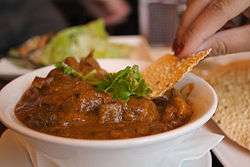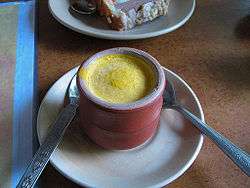Mughlai cuisine
 |
| This article is part of the series |
| Indian cuisine |
|---|
|
Regional cuisines
|
|
Ingredients, types of food |
|
See also
|
|
 |
| This article is part of the series |
| Pakistani cuisine پاکستانی پکوان |
|---|
|
See also
|
|
Mughlai cuisine consists of dishes developed in Medieval India by the nobility of the Mughal Empire. It represents the cooking styles of the Muslims used in North India (especially Uttar Pradesh and Delhi), Pakistan (particularly among Muhajir people), and the Indian cities of Hyderabad and Bhopal.[1][2][3] The cuisine is strongly influenced by Central Asian cuisine, the region where the Turco-Mongol Mughal rulers originally hailed from, and it has in turn strongly influenced the regional cuisines of modern India, Pakistan and Bangladesh.[4]
The tastes of Mughlai cuisine vary from extremely mild to spicy, and are often associated with a distinctive aroma and the taste of ground and whole spices.[5] A Mughlai course is an elaborate buffet of main course dishes with a variety of accompaniments.[6] Mughlai cuisine also gave rise to the Awadhi cuisine of Lucknow.
Dishes
The native tongue of the Mughals were Chagatay Turkic languages and the official adopted language of the Mughal Empire was Persian, so many Mughlai Indian dishes were named in the Turkic and Persian languages. Dishes include various Kebabs, Kofta (meatballs), Nihari, Pulao (a.k.a. Pilaf in Central Asia), and Biryani. Paneer is used for preparing vegetarian dishes to suit vegetarian dietary requirements.
Other dishes include:
- Kachri Qeema
- Haleem (Khichda)
- Mughlai Chicken
- Biryani
- Mughlai Paratha
- Qeema Matar
- Meat Durbari
- Mughlai Chicken Pulao
- Murg Kababs Mughlai
- Murg Noorjehani
- Murg Kali Mirch
- Murgh Musallam
- Kofta Shorba
- Nargisi Kofta
- Murg Tandoor
- Murg Chaap
- Murg Masala
- Malai Kofta
- Navratan Korma
- Reshmi Kabab
- Boti Kabab
- Shahjehani Murg Masala
- Shahi Chicken Korma
- Shahi Kaju Aloo
- Shahi Rogan Josh
- Pasanda
- Rezala
Desserts
- Shahi Tukra is a rich bread pudding with dry fruits, flavoured with cardamom.
- Barfi
- Kalakand
- Kulfi
- Sheer korma
- Falooda
- Anjeer Halwa (Figs sweet dish)
- Kesari Firni is a rice based sweet dish streaked with Saffron
- Kheer
References
- ↑ "Muslim Cuisine - Islamic Cuisine and Recipes- Mughlai Recipes or North Indian Recipes -". www.indianfoodsco.com. Retrieved 2016-11-28.
- ↑ "Mughlai Cuisine - Mughlai Food, Popular Mughlai Dishes". www.culturalindia.net. Retrieved 2016-11-28.
- ↑ "Mughlai Cuisine". Recipes Wiki. Retrieved 2016-11-28.
- ↑ Royal Mughal Ladies and Their Contributions. Retrieved 1 June 2014.
- ↑ http://www.dawn.com/weekly/review/archive/070301/review14.htm
- ↑ "The Telegraph - Calcutta (Kolkata) - Jharkhand - Mughlai cuisine tops popularity charts in capital".
Further reading
- Mughlai Cook Book, Diamond Pocket Books, ISBN 81-7182-547-8
- Nita Mehta's Vegetarian Mughlai Khaana By Nita Mehta, Published 1999 ISBN 81-86004-10-6
- Mughlai By Amrita Patel Published 2004, Sterling Publishers, 160 pages ISBN 81-207-2646-4

